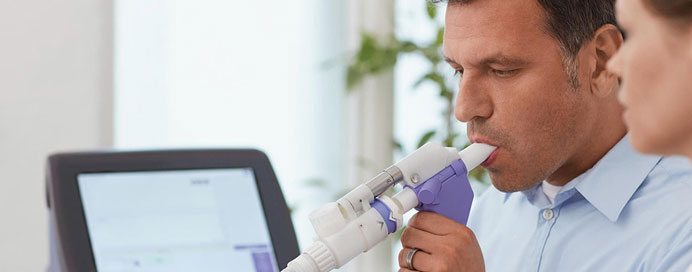Pulmonary Function Test
Home / Dr. Kushal Chidgupkar
OUR SERVICES
Pulmonary Function Test

Pulmonary Function Tests (PFTs) are a group of non-invasive diagnostic tests that assess the function of the respiratory system, including the lungs and airways. These tests provide valuable information about lung function and can help diagnose various respiratory conditions.
1- Spirometry:
- Measures the amount and speed of air that can be inhaled and exhaled.
Procedure:
- The individual breathes forcefully into a spirometer, which records the volume and flow of air.
Parameters Measured:
- Forced Vital Capacity (FVC), Forced Expiratory Volume in one second (FEV1), and the ratio of FEV1 to FVC.
2- Lung Volumes:
- Assesses the amount of air in the lungs and how well the lungs expand and recoil.
Procedure:
- Involves breathing in and out of a specialized chamber or using a body plethysmograph.
Parameters Measured:
- Total Lung Capacity (TLC), Functional Residual Capacity (FRC), Residual Volume (RV), and Inspiratory Capacity (IC).
3- Diffusion Capacity Testing:
- Measures how effectively oxygen moves from the lungs into the bloodstream.
Procedure:
- Involves inhaling a small, harmless amount of a gas (usually carbon monoxide) and measuring how much gas is absorbed by the blood.
Parameters Measured:
- Diffusing Capacity of the Lungs for Carbon Monoxide (DLCO)
4- Diffusion Capacity Testing:
- Measures the maximum speed of expiration.
Procedure:
- Involves blowing forcefully into a handheld device called a peak flow meter.
Parameters Measured:
- Peak Expiratory Flow Rate.
5- Arterial Blood Gas (ABG) Analysis:
- Measures the levels of oxygen and carbon dioxide in the blood.
Procedure:
- A small sample of blood is drawn from an artery, usually from the wrist.
Parameters Measured:
- Partial pressure of Oxygen (PaO2), Partial pressure of Carbon Dioxide (PaCO2), pH, and bicarbonate levels.
